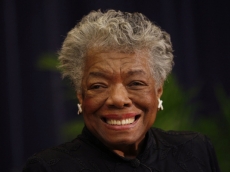By Elaina J. Kroll
The Orange County Register
October 23, 2009
http://www.ocregister.com/articles/children-book-abuse-2619817-victims-angelou
 |
| Author Maya Angelou delivers a tribute to South African Archbishop Emeritus Desmond Tutu at the J. William Fulbright Prize for International Understanding Award Ceremony at the State Department in Washington, Friday, Nov. 21, 2008. |
At a recent Huntington Beach City Council meeting, former Westminster School District Trustee Judy Ahrens read a scene from Maya Angelou's memoir "I Know Why The Caged Bird Sings" where an 8-year-old girl is raped. Ahrens' intention was to shame and embarrass the council so that it would support banning the book from school libraries.
Ahrens said that banning the book would preserve the innocence of the high-school-age children who would be exposed to the tragic scene. Unfortunately, she has it all wrong.
The only way we can preserve the innocence of our children is by allowing an open and honest dialogue about sexual abuse and never allowing a victim's story to be hidden in shame and secrecy. Banning the book tells victims that they should remain silent, and when victims remain silent, perpetrators continue to hurt children.
Statistics show that one in four girls and one in six boys will be sexually abused by age 18. More than 90 percent of these crimes are never reported, because children are scared, threatened, confused and in many cases – especially with incest – the child loves the person who hurt them. Other victims, especially women, blame themselves for the abuse. All victims are ashamed – especially when they are faced with a society that speaks of abuse in hushed tones, pity and humiliation … or in Ahrens' case, not at all.
For these children, innocence is already lost. The only way to help them heal and begin to build a better world is to be open and embrace our victims and the stories they have to tell.
How do we do this? Our community must have open, honest, empowering dialogue with our children as early as possible. We also need to share that same dialogue in our communities, where children are at risk because community leaders want to silence survivors. Angelou's book is not a source of embarrassment, in fact, it is a source of healing and an essential tool to empower children being abused to tell the police.
Is the scene in Angelou's book upsetting? Yes. But in her story, Angelou finds her strength. Teens who read the book – especially those who are being sexually abused – can see that by coming forward and telling their story, they can take back their pride, seek justice and make sure that what happens to them doesn't happen to others. Through openness, we can preserve innocence.
We need to tell teens and young adults that sexual abuse is not a secret they need to carry on their own. Society must convince them that reporting sexual abuse to law enforcement is safe and that owning their story is the way that they can take control of their healing. Their stories may be tragic and uncomfortable, but they are not shameful and should never be hidden.
How do we stop this cycle? We must encourage our teens to read books like Angelou's. We must begin to foster an open dialogue in the media, our schools and our communities. Child sexual abuse should never be talked about in hushed tones – too many have already suffered too much.
We also need to have a talk with parents and encourage them to empower their children – to report, to testify in court, and to ensure that other children will not be hurt. Finally, we as a society must work together to ensure that our civil and criminal laws protect children from abuse, instead of protecting predators from jail.
When we silence and shame our victims, we endanger our children. Angelou's is a voice for healing and innocence, and by banning her book, we push vulnerable victims back into the closet of shame and silence and ensure that predators will escape justice. Only through truth will we have a world where our children are safe.
Any original material on these pages is copyright © BishopAccountability.org 2004. Reproduce freely with attribution.